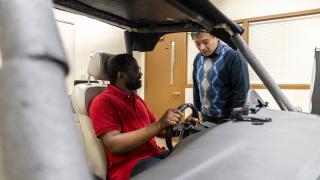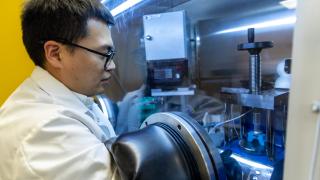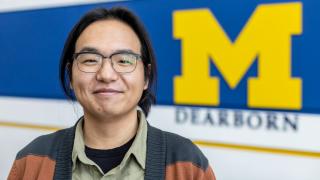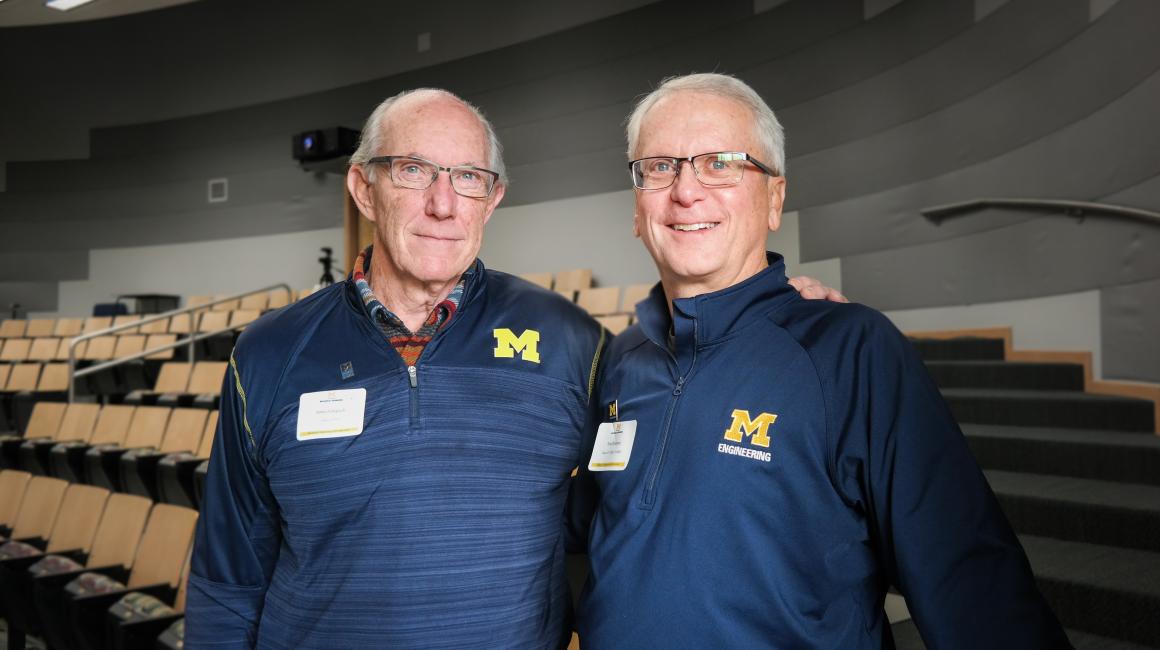
This article was originally published on November 25, 2019.
Mechanical engineering was one of two inaugural programs at UM-Dearborn when it opened in 1959, and a few weeks back, dozens of current students, alumni, professors and professors emeritus gathered on campus to celebrate the department’s 60th anniversary. It was a day filled with both big-picture reflections on how far the university has come and colorful personal anecdotes from the old days. Among those sharing a few of the latter were Tom Demmon and Jim Gingrich — two Grand Rapids natives who have been friends since middle school and who were recruited to UM-Dearborn in 1971. After the anniversary events, we tracked down Tom and Jim to talk about their time here, their experience with campus housing (yes, that was a thing in the ‘70s) and how their college experience shaped their lives.
The Reporter: So even today, the vast majority of our students come from the metro Detroit area. You want to tell us how a couple guys from Grand Rapids ended up here at UM-Dearborn in the early 1970s?
Tom Demmon: So Jim and I have been friends since 7th grade. We went to high school together, and then went to what was, at the time, Grand Rapids Junior College. One day, a representative from UM-Dearborn came to campus to speak with us. I remember it was supposed to be someone else, but Professor George Kurajian was a last-minute substitution. When we met him, he was just the nicest guy in the world, smiled ear-to-ear, and, of course, he was incredibly brilliant. I think he had us convinced right then and there to go to UM-Dearborn.
Reporter: You remember it the same way, Jim?
Jim Gingrich: Absolutely. I remember when George came and spoke with us and told us about all the benefits of UM-Dearborn, it just felt like we could really do this. I had a great family, but we had a limited income. I’d saved up money for school working for two years while I was going to community college, but I knew I probably wouldn’t have enough to get through a place like Michigan. What was unique about UM-Dearborn was its co-op program. That meant I could work and pay for school as I went. Without that, I might have been able to afford one or two terms at Michigan, but there was no way I could graduate; and in those days, student loans weren’t a common thing. So having the opportunity to co-op was what made it possible.
Reporter: Give us a snapshot of what that co-op system looked like.
Tom: Well, when we got there, I think the university was just starting its first four-year programs, and engineering and business were only junior- and senior-level co-op programs. So everybody that was in our mechanical engineering cohort of 12 students had two years of college somewhere else. At that time, you alternated between work and classes every semester. So we did three semesters of work with four semesters of school. And Jim and I were fortunate enough to get co-op assignments right away. I got into Chrysler and Jim got in at Federal Mogul. We felt pretty lucky, because the economy was really bad and jobs weren’t plentiful. I completed three semesters at three different locations within Chrysler, and when I graduated, I got a couple job offers from Chrysler and about three other offers. I think it was because we had the experience. We came out of that program not just knowing the theory, but knowing how to be engineers. Companies really loved that.
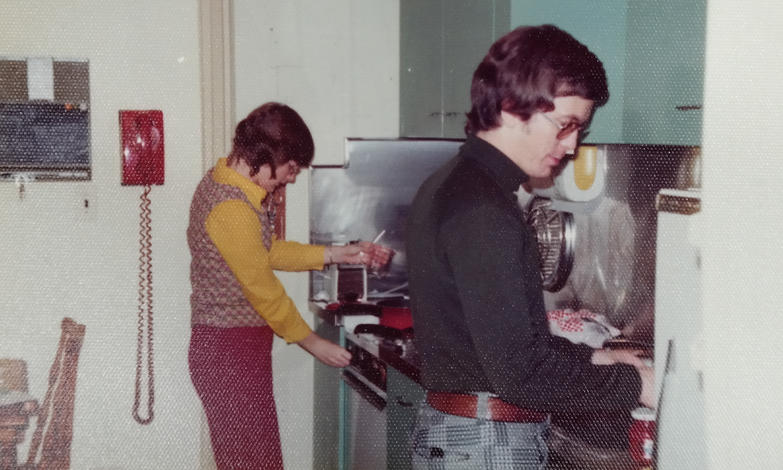
Reporter: And Jim, how’d you fare right after graduation?
Well, it was tremendous. Even though we graduated six months or so later than the kids who had gone to a non-co-op program, we already had a year of on-the-job experience. So in November, just before graduation, I had a very good job offer from Federal Mogul. And I had another great offer back in Grand Rapids. To have two opportunities, at that time, was really exciting. I had been dating my girlfriend for four years; she was an R.N. in Kalamazoo and going to school and I was down at U-M. We wanted to get married, and I said we could go for it as long as we could make $5,000 in a year. So when she graduated and I was close to graduating, we did the math: We figured out between her job in Detroit and the money I would make during my summer co-op, we would make exactly $5,000 that year. When we got home from our two-day honeymoon on Lake Michigan, we had 39 cents in our checkbook. But we felt like we were going to make it. We had two used cars that both ran. We weren’t going to have any debt. There was so much excitement for the future.
Reporter: Wow, that’s amazing. And so careerwise, did you end up staying in the engineering field?
Tom: So right out of school, I went to work for Chrysler’s Institute of Engineering. That was really attractive to me because you rotated around for two years and got a new assignment every three months in their research and development center. While I was doing that, I also got my master’s at UM-Dearborn. It was a pretty great situation because you only had to work three days a week while you were taking your classes, and I never saw a tuition bill because Chrysler just picked it up. I enjoyed it, but my time overlapped with one of the periodic downturns, and I got laid off for three months. So here you were, a 20-something ready to go in your career and you end up in the unemployment line. It kind of soured me on staying in the automotive industry.
I went back to Grand Rapids after leaving Chrysler and I worked in various roles, including engineering, project management, consulting, teaching and leadership. I worked in material handling for about a decade. Then I went to Steelcase for 17 years. And I worked another 15 years at Grand Valley State University, where I ended up working with students in co-op and career services. In fact now, in my “retirement,” I’m working part-time as a career services advisor in U-M’s College of Engineering. So I guess you could say I’ve returned to my roots. That co-op experience at UM-Dearborn meant so much to me, and I still feel like it’s the best way to teach engineering. It’s an applied science, so you need to blend the theory with real-world experience. I’d love to see more universities return to that model.
Reporter: And where did your career path lead you after UM-Dearborn, Jim?
Jim: Right out of school, my wife and I returned to Grand Rapids, and I took a job at Conveyor Logic. I was actually the first college graduate engineer this company had hired, and I eventually became the VP of engineering and sales. It was exciting because it was a rapidly growing company, and I got to hire my own staff. But I left there after about eight years when I got an opportunity to join Herman Miller. I was so fascinated by their marketing programs, so I did a bit of a career change, and I worked as a technical person in the product marketing area. At that time, there were all these new electronics companies sprouting up in the U.S., like Hewlett Packard and Texas Instruments, and we were designing and building office environments for them. I loved seeing the business side of it. But then about two years in, the engineering group had an opening, so I flipped back. I worked first in new product development and eventually became VP of engineering at Herman Miller. It was very exciting for me to have all those different opportunities, and the company was growing so quickly. I think when I started it was about a $300-million company; when I left it was a $1.2-billion company. And the innovation and the high level of engineering at Herman Miller meant we could build nearly anything the designers could come up with.
I’ll second what Tom says about co-op education. If it were up to me, I’d have everybody do it. It’s the best way to learn, but it’s also a great way to find out if something is what you really want to do. The last thing you want to do is spend all this time in college training for a career that’s not a good match for you, and you want to find that out as early as possible. I was fortunate enough to have a co-op program that allowed me to explore something I loved. You know that saying, If you love what you do, you never work a day in your life? That’s exactly how I feel when I look back at my career. And I really think the University of Michigan prepared me for all of it.

